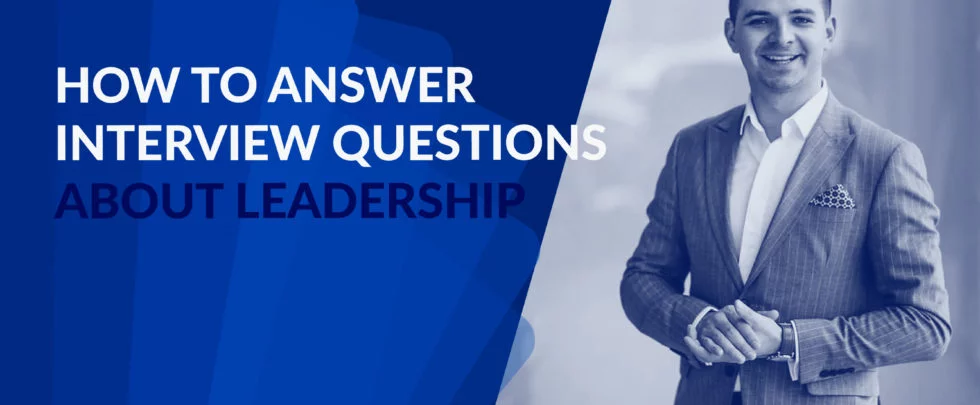We know very well that when it comes to job interviews, the interview questions about leadership you get asked can vary greatly. One question that often intimidates candidates is the one about leadership experience.
An interviewer may ask;
“What was your leadership role in a previous job?” or “Can you provide an example of how you led a team?”.
Being able to answer these types of questions competently will help ensure a successful job interview. It will not only show your leadership ability but also your leadership position that your hiring manager will definitely be pleased to talk you through!
But don’t worry, we are coming to the rescue if this type of question is not something you have figured out how to answer yet!
In this article, we will share tips and strategies for successfully answering interview questions about leadership experience. And also we’ll demonstrate why it’s so important to have examples and anecdotes ready.
Not only that, but you will also see how the star method comes in handy in the sample answers provided to you!
Follow these three steps to answer leadership-related interview questions
These three steps will ensure that your answers show employers what makes you stand out as an effective leader.
If you prepare and give concrete examples, this proves that you have the ability to think quickly and on your feet!
Present Leadership From Your Perspective
When you are asked about leadership in an interview, present your answers from your perspective. This means that you should share how your approach to leading a team has allowed the team to accomplish great things.
Focus on using language that reflects the kinds of leadership qualities companies are looking for, such as communication skills, problem-solving abilities, or influencing other people within the organization.
For example, this can sound like this, what kind of tools you used to bring the team together or motivate them? Your hiring manager would love to hear more about this because it allows them to see you in action and line up whatever is on your resume.
Be sure also to talk about how you involved other members of the team in decision-making and set up incentives for tasks being successfully completed by working together.
Find Your Story
When interviewers ask about leadership, they’re usually looking for stories. The best answer to leadership questions will have stories that illustrate your leadership qualities.
Find your story before the interview so you can share it at length during the interview. Ask yourself: What types of situations demonstrate my success in leading others?
For each example, think about a situation, what role you had in it, what challenges you faced, and how you overcame them – then narrate that story with specifics.
These stories should provide insights into who you are as a leader, demonstrating techniques and approaches that make you successful at leading others.
Use these stories as examples during the interview when explaining how your approach to leading teams makes them better than ever!
The world is your oyster when it comes to all the stories you can share, you never know which one gives you the best results either!
Give a Structured Answer
For this one, the best way to answer interview questions about leadership is to give a structured answer. Your response should include specific examples of how you’ve used your leadership skills in previous work experiences.
This will help demonstrate your experience leading teams and decision making capabilities – both of which are important qualities employers look for in leaders.
When giving an example, start by describing the situation, then explain the action you took, and finally the successful outcome that resulted from your actions. This kind of structured answer will help show off your problem-solving skills while also showing potential employers that you have the leadership experience they need.
Not only that, but don’t forget to highlight any applicable accomplishments throughout this process! That way it’s easy for employers to visualize your success in a leadership role.
Popular Interview Questions for Leaders and Strategies for Answering Them
Now that we’ve gone over the basics, let’s take a look at some of the most common leadership interview questions along with sample answers for leaders and strategies for answering them!
We have equipped you with the best answers to impress your hiring manager!
We know that sample answers might get you on the right track so we made sure every question had one!
Can you describe a time when you had to lead a team through a difficult situation?
Answer: “One time when I was working at a software development company, one of our clients was facing a critical issue with the software we had developed for them.
The client was relying on the software to run their business operations, and the malfunction was causing major disruption. My team and I were put in charge of fixing the issue as quickly as possible.
I knew that this was going to be a challenging task, so I made sure to take a systematic approach to the problem. First, I gathered all the relevant information about the issue and assigned specific tasks to each team member. I held regular team meetings to keep everyone updated on our progress and to ensure that we were all on the same page.
Despite the pressure to resolve the issue quickly, I encouraged my team to work at a steady pace and not to rush. I also provided support and guidance whenever it was needed.
As a result, we were able to identify the root cause of the problem and implement a solution. This restored the software to full functionality.
The client was extremely impressed with how we handled the situation. They also expressed their gratitude for our hard work and dedication.
This experience taught me the importance of clear communication, teamwork, and perseverance in times of difficulty. So I am proud of the impact we were able to have as a team.”
How do you ensure that all team members are participating and contributing to a project?
Answer: “To ensure that all team members are participating and contributing to a project, I follow a few key steps. First, I establish clear roles and responsibilities for each team member and make sure that everyone understands their individual tasks. This helps to eliminate any confusion about what is expected of each person.
Than I encourage open communication and encourage team members to voice their opinions and ideas. This fosters a sense of inclusivity and encourages everyone to contribute.
Also, I hold regular team meetings where we can discuss our progress and any challenges we may be facing. I also make sure to actively listen to each team member during these meetings and take their input into consideration.
And, I provide regular feedback to each team member on their performance and encourage them to provide feedback to one another. This helps to build trust and a sense of accountability among the team.
Finally, I recognize and celebrate the contributions of each team member, both individually and collectively. This helps to boost morale and motivate everyone to continue working hard.
By following these steps, I have found that all team members feel valued and invested in the project, and this leads to a more productive and successful outcome.”
What methods do you use to resolve conflicts within your team?
Answer: “I handle conflicts within my team by first encouraging open communication to understand each person’s perspective and concerns.
I then facilitate a solution-focused discussion where all team members can express their opinions and ideas. I aim to find a mutually agreeable solution that takes into account the needs and interests of all parties involved.
If necessary, I also seek guidance from a neutral third-party mediator to help resolve the conflict. My ultimate goal is to promote a positive work environment and maintain strong working relationships within the team.”
Can you give an example of how you have helped to develop the leadership skills of others?
Answer: “One time I was working as a manager at a retail store, and I noticed that one of my employees, who was new to the role, was having difficulty leading their team and delegating tasks effectively. It was an opportunity for growth and wanted to help them develop their leadership skills.
I sit down with the employee and discussing their challenges and provided them with some training on leadership and delegation, including tips on how to effectively communicate with their team and delegate tasks in a way that everyone could understand.
In addition, I paired the employee with a more experienced team leader for a mentorship program. They were able to observe and learn from the experienced leader, and receive feedback and guidance on their own leadership style.
Finally, I regularly checked in with the employee and provided them with constructive feedback on their progress. I also encouraged them to seek feedback from their team members and made sure to acknowledge their efforts and successes.
As a result of these efforts, the employee was able to effectively lead their team and was able to make a positive impact on the store’s overall performance. I was proud to have played a role in their development and am always looking for opportunities to help others grow and develop their leadership skills.”
Can you describe your leadership style and how it has evolved over time?
Answer: “My leadership style has evolved over time as I’ve gained more experience and learned from my successes and challenges. Initially, I was more directive, providing clear instructions and expecting my team to follow them.
However, I’ve since come to understand the value of a more collaborative approach that empowers my team to take ownership of their work and contribute their ideas and perspectives.
Now, I consider myself to be a participative leader. I believe in engaging my team members in the decision-making process and encouraging them to take an active role in shaping the direction of projects and initiatives. I make a point to listen to their ideas. Also, I provide constructive feedback to help them grow and develop in their careers.
So I try to lead by example, setting high standards for myself and demonstrating the behaviors and values that I expect from my team. By doing so, I can create a positive and productive work environment where everyone feels valued and motivated to do their best work.
Overall, my leadership style has become more flexible and adaptable over time. I’ve come to understand the importance of being open to new ideas and approaches. So, being willing to change and evolve as the needs of my team and organization change.”
What strategies do you use to effectively assign tasks and responsibilities within your team?
Answer: “Delegating responsibilities effectively within a team requires clear communication, trust, and a thorough understanding of each team member’s strengths and weaknesses.
First, I take the time to understand each team member’s skill set and interests. This allows me to assign tasks that are aligned with their strengths and provide opportunities for them to develop new skills.
Next, I communicate clearly and concisely about the goals and expectations for each project or task. This includes outlining specific deliverables, deadlines, and any resources that are available to the team.
I also encourage open communication and ensure that team members feel comfortable asking questions or raising concerns. This helps to build trust and ensures that everyone has a clear understanding of what is expected of them.
In addition, I make sure to provide regular feedback and support to my team members as they work on their assigned tasks. This includes regular check-ins, providing guidance and resources as needed, and acknowledging their successes and efforts.
Finally, I hold myself accountable for the overall success of the project and work closely with my team to identify and address any challenges or obstacles that may arise.
By working together and delegating responsibilities effectively, we can ensure that projects are completed on time and to the highest standards.”
How do you motivate and engage team members towards a common goal?
Answer: “Motivating and engaging team members towards a common goal requires clear communication, a shared vision, and a positive and supportive work environment.
First, I work to establish clear goals and expectations for the team, and communicate them in a way that is easy to understand and aligns with each team member’s interests and strengths.
Next, I create a positive and supportive work environment that encourages collaboration and open communication. This includes regular team-building activities and opportunities for team members to get to know each other on a personal level, which can help to foster a sense of camaraderie and teamwork.
I make sure to recognize and reward the achievements of individual team members and the team as a whole. This can include things like bonuses, promotions, or public recognition during team meetings or company-wide events.
Finally, I lead by example, demonstrating a strong work ethic, positive attitude, and commitment to the team’s success. I believe that by doing so, I can inspire and motivate my team to work together towards a common goal.
Overall, by creating a positive and supportive work environment, communicating clearly, and recognizing and rewarding success, I can help to motivate and engage my team members towards a common goal.”
Final Thoughts
In order to provide effective answers to leadership-related questions in interviews, it is important to be both honest and reflective about your skills and experience.
So, this means that showing a clear understanding of what good leadership looks like, as well as how you demonstrate those qualities, will help you stand out and make a strong impression on the hiring team!
By the way, if you’re looking to boost your job interview game then you’re in the right place! With our expert interview guides, you’ll feel confident and ready to impress your potential employer. So, give it a shot and see for yourself.


